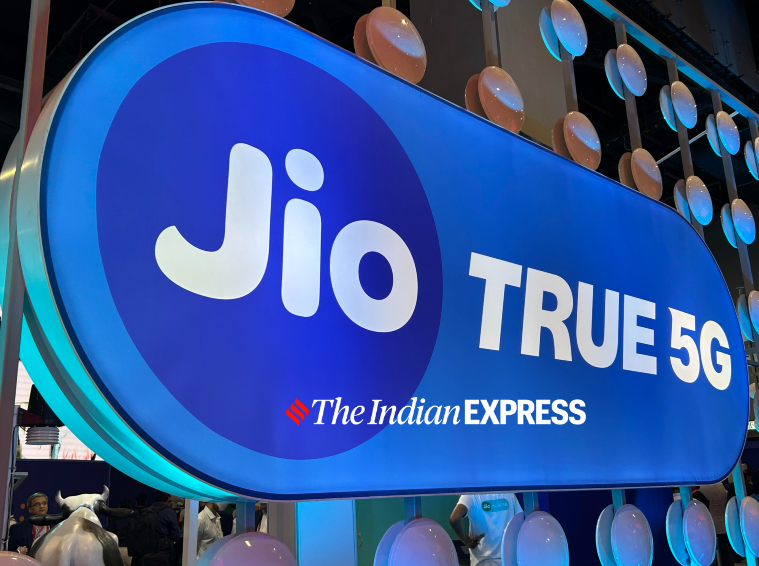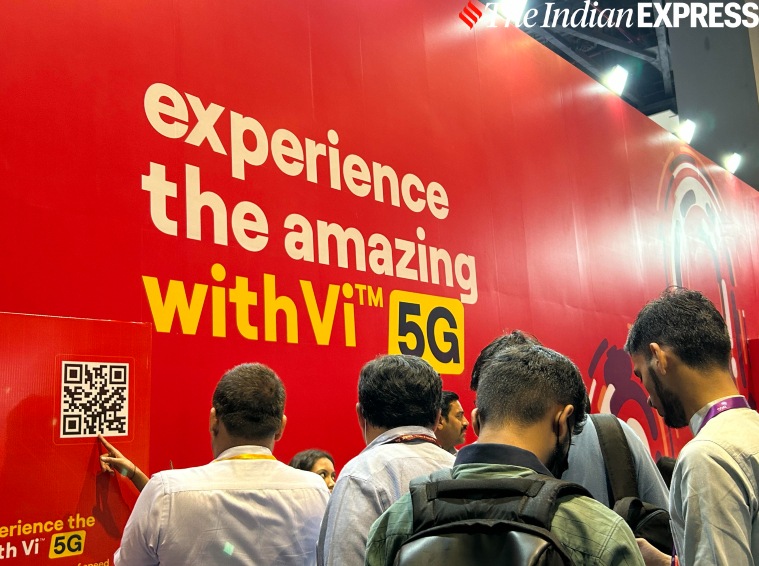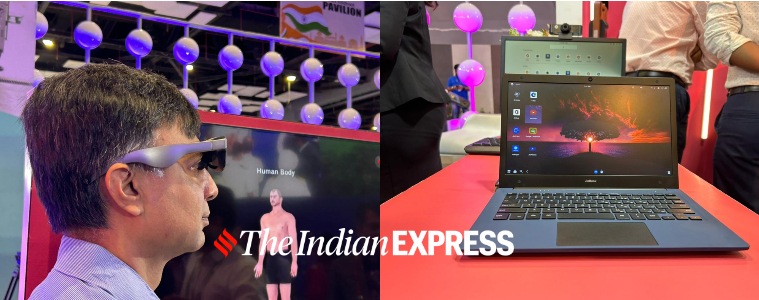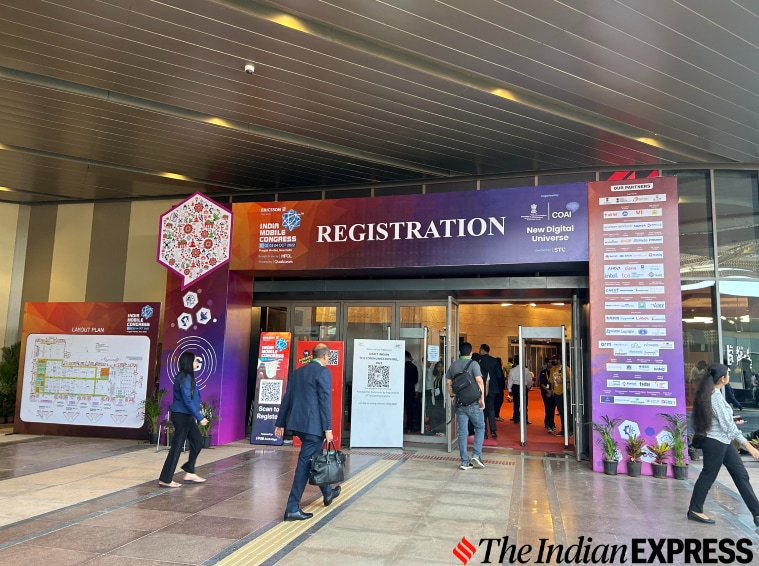The last time I visited India Mobile Congress was in 2019, way before the pandemic, and everywhere there was a buzz about 5G spectrum auctions expected to happen that year. Ericsson and Qualcomm completed the first ever live 5G video call in India and mobile brands had just started offering 5G smartphones. Fast forward to 2022, and nothing much has changed on the ground even as this edition of the forum has triggered the rollout of 5G services in India. Operators like Airtel and Jio have announced the first cities to get the services and 5G handsets are now available for as low as Rs 10,000.
Here are my big takeaways from the India Mobile Congress 2022.
5G was everywhere
The moment you enter the Pragati Maidan Convention Center in New Delhi, banners with 5G branding greet you everywhere. For the last few years, 5G has been the main theme at IMC. It started as a vision, then turned into a promise, and this year 5G networks have started rolling out services. Much of the show revolved around 5G and how it could impact your life in a positive way. There was a clear emphasis by telecom operators and hardware makers to establish the narrative that “5G” is more than the tech buzz it has been so far.
As Reliance Industries Chairman Mukesh Ambani said in his speech at IMC: “5G is much more than the next generation of connectivity technology. In fact, I think of 5G as an acronym for “5 Goals” that fundamentally can transform our nation.” Telecom companies, despite being burdened by debt, are betting on fifth-generation wireless standards to keep up with the growing demand for streaming content and mobile games by customers.
The intention is to increase revenue streams and bring more users to their platforms. But operators are also aware that 5G will only penetrate a massive country like India when there is an ecosystem to unlock the full potential of the next-generation wireless technology.
 Jio will be launching 5G network services in four cities this Dussehra – Delhi, Kolkata, Mumbai and Varanasi. (Image credit: Anuj Bhatia/Indian Express)
Jio will be launching 5G network services in four cities this Dussehra – Delhi, Kolkata, Mumbai and Varanasi. (Image credit: Anuj Bhatia/Indian Express)
No word on 5G tariff plans
I was hoping to get a rough idea about how much users have to pay to get 5G services on their phones but was left disappointed when nothing was announced at the India Mobile Congress. None of the three big telecom operators in India — Reliance Jio, Airtel and Vodafone Idea — gave any indication on pricing. All we got to hear from Mukesh Ambani is that his company plans to offer 5G services “more affordable than anywhere else in the world”. Experts say initially customers will need to pay a premium to get faster speed on their phones and only when 5G will become mainstream, tariffs will match what users are currently paying for 4G. I expect both Reliance Jio and Airtel to announce 5G tariff plans around Diwali.
 The rollout of fifth-generation wireless networks known as 5G has kicked off in India. (Image credit: Anuj Bhatia/Indian Express)
The rollout of fifth-generation wireless networks known as 5G has kicked off in India. (Image credit: Anuj Bhatia/Indian Express)
Focus on India-specific 5G use cases
From connected mobile ambulances to a cattle tracker, India-specific use cases of 5G were the talk of the town at IMC. The use of 5G in solving real-life problems like remote surgery could be a lifesaver. But use cases of 5G like these have been demonstrated previously as well. I, particularly, got excited when I saw the live demonstration of cloud gaming and how it could make game consoles less relevant in the future. The fact that I could play AAA games on a smartphone would be huge. Of course, cloud gaming calls for a fast and stable internet connection. I am reasonably confident once 5G services start rolling out in India we will see an uptick in this segment. For major cloud gaming services like Microsoft Xbox Game Pass Cloud Gaming and Nvidia GeForce Now, India could be the next big market to pay attention to.
 Jio showcased the JioGlass (left) and JioBook (right) at IMC 2022. (Image credit: Anuj Bhatia/Indian Express)
Jio showcased the JioGlass (left) and JioBook (right) at IMC 2022. (Image credit: Anuj Bhatia/Indian Express)
JioGlass and JioBook
Surprisingly, no company chose to launch new 5G smartphones at IMC although Jio gave a sneak preview of the upcoming JioBook and JioGlass. Both are different products aimed at different users, with the JioBook being targeted at school students. While the JioBook is a low-cost 4G-enabled laptop powered by a Qualcomm processor and JioOS running on top of Android, JioGlass is a mixed-reality headset that connects to the internet via a cable that must be plugged into the owner’s smartphone. I see a lot of potential in the JioGlass in the future as it offers a new user experience, something that will play a credible role in the metaverse. It’s good to see that an Indian company like Reliance is behind the JioGlass that will provide consumers with mixed and augmented reality experiences.
 It’s good to attend a massive tech event in person after a long time. (Image credit: Anuj Bhatia/Indian Express)
It’s good to attend a massive tech event in person after a long time. (Image credit: Anuj Bhatia/Indian Express)
Physical events are back, finally
Attending a big tech event in person after two long years was a surreal experience, at least for me. This year, IMC once again brought back telecom executives, trade insiders, policymakers and the press together under one roof. It’s the latest sign that the tech world may be inching back to the traditional in-person events that were the norm before the pandemic forced everything to go virtual. There is an energy and enthusiasm for attending physical events, which cannot be replicated by virtual shows. At IMC 2022, I met key executives and industry insiders in a face-to-face format. After a long time, I got a demo of new technologies and upcoming products by real people which underlined why it’s so important to see tech products in person.
.